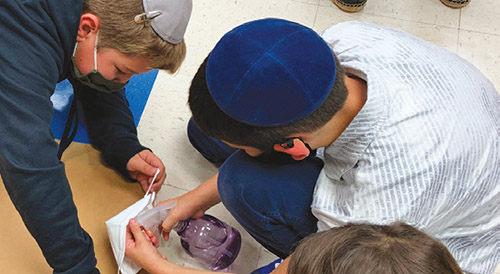


Covid-19 has affected the lives of children all over the world on a daily basis. Many schools, including Yavneh Academy, now have mask mandates. The Center for Disease Control (CDC) states that “If you are not fully vaccinated and aged 2 or older, you should wear a mask in indoor public places.”
The fourth and fifth grade students in Mrs. Hirschhorn’s STEM electives at Yavneh Academy decided to test the efficacy of face masks and to also determine which type of mask is the most effective. This is true living science, testing something that affects the students on a daily basis. They used the scientific method to design and then implement an experiment to simulate what happens when someone with Covid-19 wears a mask.
They began by stating a hypothesis: Facemasks can prevent the spread of Covid-19. Some facemasks may be more effective than others. Then they designed an experiment to prove their hypothesis. The experiment had to include a control to help prove their theories.
The students used spray bottles of water to simulate breathing. There were two settings on the spray bottles: “mist” simulated regular breathing and “stream” simulated coughing or sneezing. They measured how far the uncovered spray could reach. This would be their control. They then covered the bottle with various types of masks to test their effectiveness by measuring the distance the water can travel.
The KN95 masks let through almost no water, a result that most students predicted. The blue paper masks, however, surprised the students with how much water they blocked. Max B. stated, “I didn’t expect the masks to be as effective as they were.” The cloth masks had various results. While all the masks were able to stop the water in the “breathing” setting, the cloth masks did allow some water through while in the “coughing or sneezing” setting, although even at this setting the masks reduced what came through to well within the six foot guidelines set by the CDC. The students recorded their data and came up with the conclusion that masks do indeed stop the spread of the water or germs. Yavneh’s scientists will now “publish” their findings by creating public service announcement videos using green screen technology which they plan to share with Dr. Fauci at the NIH.













